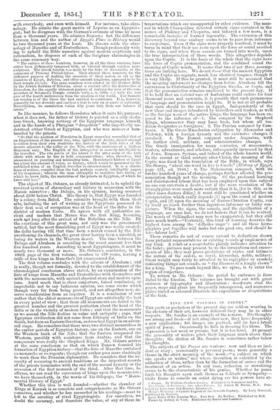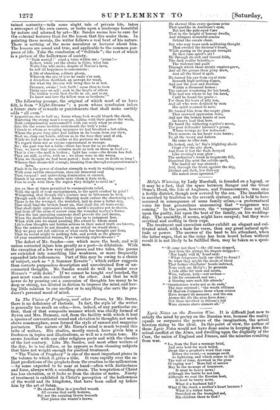FIVE .NEW VOLUMES OF POETRY. * THE poets or poetasters of
the present day are seldom wanting in the rhetoric of their art, however deficient they may be in other respects. Mr. Sandes is an example of the reverse. His thoughts are strong and fresh—if not altogether new, they have frequently a new application ; his images are poetical, and he has a latent spirit of poesy. Occasionally he fails in dressing his ideas. The expression is not weak or prosaic, but it is too level. At present the generality of writers pitch their language much above their thoughts; the diction of Mr. Sondes is sometimes rather below his thoughts. The subjects of his Poems are various : now and then an inci- dent or story ; occasionally a personal poem ; more generally a theme in the strict meaning of the word—" a subject on which one speaks or -writes," and where invention is exhibited by the adduction of ideas, rather than by the formation of scenes and the treatment of an action. In any case, reflection or moralizing seems to be the characteristic of his genius. Whether he pours forth his thoughts upon such themes as Solitude or Sympathy— visits Rome to console an artist dying ere his powers have at-
Poems. By William Stephen Sande. Published by Longman and Co. The Vision of Prophecy. and other Poems. Ey James D. Burns, M.A. Pub- lished by John:tone and Hunter, Edinburgh. Helig's Warning : a Cymric Legend of the Seventh Century. By Lady Marshall. Published by Masters. Lyric Notes of the Russian War. Part first. By Thither. Published by Bell. Poems by Aubrey de Vere. Published by Burns and Lambert.
tamed maturity—tells some slight tale of private life, takes a retrospect of his own career, or looks upon a landscape beautiful by nature and adorned by art—Mr. Sandes seems less to care for the external features than for the lesson that lies under them. In pointing these morals, the writer follows a real bent of his nature. There is nothing of the mere moralizer or lecturer about him. The lessons are sound and true, and applicable to the common pur- poses of life. Take the conclusion of " Solitude "; the rest of which is a picture of the hollowness of society.
"'Rash mortal!' cried a voice within me ; pause !—
Reflect, while yet the choice is thine, what late Waits him who seeks, despite of Nature's laws, In self all happiness to concentrate : A life of cheerless, solitary gloom, Whereon the eye of love no smile e'er cast, A friendless deathbed, an unwept-for tomb, Are what thy dreams will bring thee to at last.
Dreamer, awake ! look forth ! cease thus to turn Thine eyes on self; seek in the hearts of others The hidden worth that dwells in all, and learn To know and love thy fellow men as brothers.'"
The following passage, the original of which most of us have felt, is from " Night-Dreams " ; a poem whose conclusion infers a future state of rewards or punishments that shall make earthly odds "all even."
"Apparitions rise to hail us ; forms whose look would blanch the cheek,
Mastering the strong man's courage, killing with their glance the weak, Hold companionship untrammell'd with our souls when ye evoke Into life the senses trodden underneath the body's yoke. Friends to whom as weeping mourners we had breathed a last adieu, Whom the grave long since had hidden in its bosom from our view, Meet us, clasp our hands, address us in the tone they used of old, While we feel no fear or wonder at the portents we behold. We regard them not as visions supernatural or strange. No; the past was but a fable—there has been for us no change. True, we know that some delusion made us look on them as dead ;- That is o'er—the spell is broken ; light has come—the dream has fled. They are still, as ever, with us ; we alone were in the wrong When we thought we had been parted : fools we were to doubt so long ! Whence that dream-felt courage, breaking thus through conquered reason's laws, Finds it in the power of slumber strength to work its waking cause ?
With your subtile emanations, rises our immortal soul Then coequal ? and unbrooking domination or control, Stands it up among the spirits unto whom it feels akin, Free to roam with them the region they delight to revel in ?
Are ye then at times permitted to communicate relief, With the spell of your enchantments, to the spirit crushed by grief? Whispering, that though life's journey may in bitterness be trod, Though each child of Adam's offspring must endure the chastening rod, There is for the wronged, the wretched, laid in store a better day, That shall bind the broken heart up, that shall dry all tears away, That shall right oppression's victims, earth's injustice put to shame, And from off the cross of sorrow raise the wounded martyr's frame. When the last appealing summons shall precede the just decree, When the death-enfranchised body rises up to judgment free, When with awe we stand awaiting His award to whom alone Life's close thoughts and hidden actions in their naked truth are known, May the sentence be not dreaded, as an ordeal we would shun ; May we pray not full oblivion of what earth has thought and done, That its record might to nothing fade, and perish as the gleams Of your unsubstantial visions, 0 ye vanishing night-dreams! "
The defect of Mr. Sandes—one which mars the book, and will unless corrected injure him greatly as a poet—is dilatation. With the exception of a few very short pieces and two tales, the poems are extended into something like weakness, or more frequently expanded into tediousness. Part of this may be owing to a choice of subject, such as "A Summer Reverie " ; which rather suggests than corrects purposeless description and unrestrained 'flow of un- connected thoughts. Mr. Sandes would do well to ponder over Horace's " utile dulci." If we cannot be taught and touched, the poet must reach one excellence or the other. And that he will never do by pouring out a succession of thoughts too many to be deep or strong, too diluted in diction to impress the mind, and hav- ing little relation to one another or to anything else save the pro- ducer's personal mood of mind.



































 Previous page
Previous page